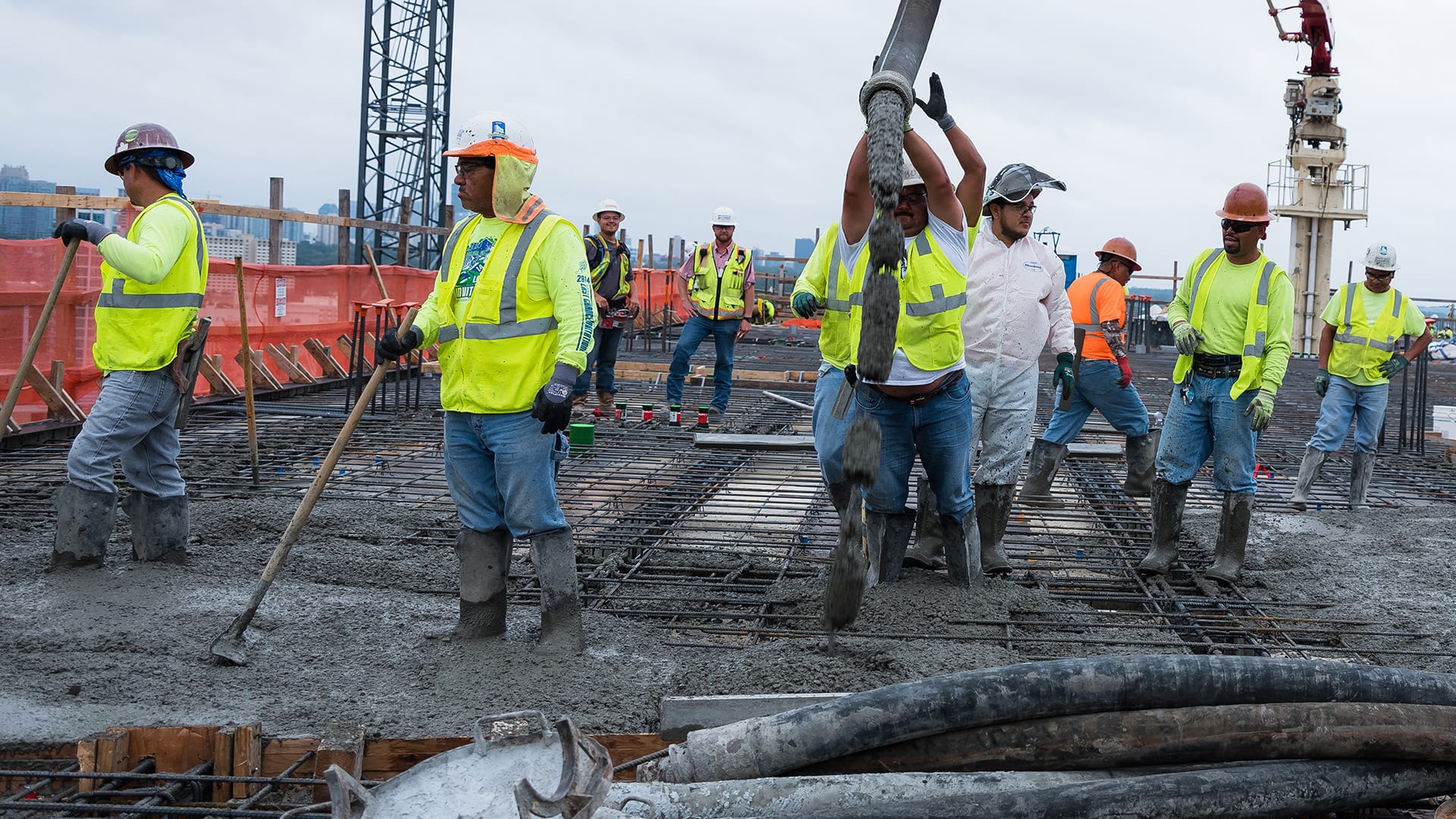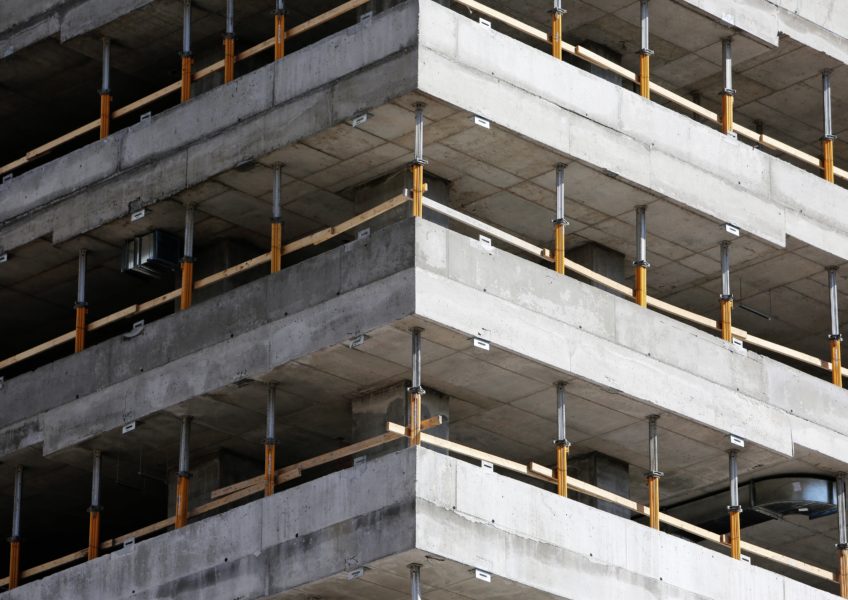Top 8 Things to Know Before Hiring Concrete Contractors Rancho Cucamonga
Wiki Article
The Crucial Duty of Concrete Foundation in Structural Honesty and Longevity
When it pertains to developing a residential property, the structure is much more essential than you may think. Concrete structures supply unequaled strength and longevity, guaranteeing your structure can endure numerous ecological challenges. Without a solid base, you take the chance of prospective problems like shifting or splitting, which can compromise security and value. Recognizing the subtleties of concrete foundations can be the secret to maintaining your investment for many years to find. What should you take into consideration next?Comprehending the Relevance of Concrete Foundations
Concrete structures are essential to the total security of any structure, as they supply the essential support required to withstand numerous tons and ecological conditions. When you consider constructing a home or an industrial area, the structure is the initial point you ought to consider. It functions as an obstacle against wetness, safeguarding your residential property from water damages. A well-placed concrete structure likewise prevents settling and changing, which can bring about splits in walls and floorings. You'll intend to ensure that the structure is correctly designed and strengthened, as this influences the long life of your building. Additionally, a strong structure can enhance energy efficiency by decreasing air leaks. Bear in mind, disregarding the value of a concrete foundation can result in costly repair services down the line. So, purchasing a top quality structure upfront is important for the honesty and resilience of your framework.
Advantages of Concrete Structures for Architectural Stability
While lots of variables contribute to a building's structural stability, concrete structures offer unparalleled longevity and toughness. You'll appreciate that concrete can stand up to extreme weather, resisting both dampness and temperature variations. This resilience means your structure is much less likely to experience splitting or moving gradually, which can jeopardize its safety.Additionally, concrete's fundamental weight gives a solid base, avoiding activity during natural events like quakes or floods. When you select a concrete foundation, you're additionally going with reduced upkeep; unlike timber, it will not rot or bring in parasites, saving you money and time in repairs.Moreover, concrete's fire resistance supplies added security, ensuring your framework can endure heats without substantial damages. Overall, purchasing a concrete foundation implies you're focusing on the lasting security and honesty of your structure, making it a sensible option for any building task.Typical Kinds of Concrete Foundations
When it involves developing structures, understanding the typical sorts of concrete foundations can aid you make informed selections for your job. One of the most common types consist of slab-on-grade, crawl space, and full basement foundations.A slab-on-grade structure is a straightforward, affordable option, where a thick concrete piece is put directly on the ground. This kind functions well in warm environments, as it minimizes warmth loss.Crawl room foundations elevate the home slightly above ground, permitting air flow and accessibility to pipes and electric systems. This design can aid stop moisture issues.Full basement foundations offer additional living or storage area while offering superb structural support. They call for even more excavation and are commonly utilized in colder environments to avoid frost heave.Factors to Consider When Creating a Concrete Foundation

Finest Practices for Putting Up Concrete Foundations
When you're setting up a concrete structure, proper website preparation is important to guarantee security (West Coast General Engineering industrial concrete). You'll additionally need to comprehend support techniques to improve stamina and sturdiness. Ultimately, don't neglect the treating procedure, as it plays a fundamental role in accomplishing a strong structureSite Prep Work Relevance
Although it may seem uncomplicated, correct website preparation is important for guaranteeing a solid and sturdy concrete structure. Beginning by removing the area of any particles, plants, or organic product that might compromise the foundation's honesty. Next, assess the dirt type and compaction; you might require to excavate or include materials to create a secure base. Level the ground to assure also weight distribution and stay clear of working out issues later. Installing correct drain systems is also necessary to stop water accumulation, which can damage the foundation with time. Mark out the foundation's dimensions precisely to guide the pouring procedure. By complying with these steps, you'll set the stage for an effective concrete structure that stands the test of time.
Support Techniques Described
As soon as the site is appropriately prepared, the following step in ensuring a durable concrete structure entails executing reliable reinforcement techniques. You must begin by utilizing steel rebar, which provides tensile stamina and aids avoid fracturing. Lay the rebar in a grid pattern, making sure it rises using spacers to keep correct insurance coverage. Additionally, consider using wire mesh for extra assistance, specifically in locations subject to hefty loads. Don't fail to remember to link the rebar crossways securely with cord. For bigger foundations, fiber support can improve longevity, minimizing the danger of shrinkage fractures. Always adhere to neighborhood building codes and standards to make sure conformity. By applying these support techniques, you'll greatly boost your foundation's strength and durability, laying a solid groundwork for your structure.Curing Process Fundamentals
To ensure your concrete structure cures properly, it's crucial to preserve adequate dampness and temperature level conditions right away after putting. Begin by covering the surface with a damp cloth or plastic sheeting to maintain dampness. This keeps the concrete hydrated, avoiding cracks and guaranteeing toughness. You must likewise monitor the temperature; ideal curing conditions are in between 50 ° F and 90 ° F. If it's also hot, haze the surface area regularly to stop rapid evaporation. For winter, think about making use of insulating blankets to preserve heat. Objective for a curing period of at the very least 7 days, as this is important for optimum stamina development. By complying with these best methods, you'll improve your structure's durability and long life, making certain architectural honesty for years to come.Maintenance of Concrete Structures for Longevity
To maintain your concrete foundation strong and long-term, regular examinations are crucial. You should additionally assure reliable drainage services remain in place to avoid water damages. If you identify any fractures, addressing them promptly will conserve you from larger issues down the line.
Normal Inspections and Assessments
While regular evaluations and assessments could look like a task, they're essential for maintaining the integrity of your concrete foundation. By consistently looking for cracks, changes, or indicators of wear, you can catch prospective issues prior to they intensify right into expensive repair services. Seek any kind of water merging around the foundation find out this here or unusual settling, as these can signal underlying issues. It's additionally important to keep an eye on any type of changes in your house's framework, like doors that stick or windows that don't open smoothly. Keeping a record of your evaluations helps track adjustments gradually, permitting for positive upkeep. Ultimately, these assessments ensure your structure stays stable, sustaining the durability and security of your whole framework. Don't neglect this important element of homeownership!Effective Water Drainage Solutions
Routine inspections can expose issues like drain troubles that may compromise your concrete foundation's security. To avoid water build-up, ensure your gutters and downspouts straight water away from the structure. look what i found Installing French drains can successfully redirect surface and groundwater, lowering pressure on your foundation wall surfaces. In addition, rating the dirt around your home assists ensure that water streams away, instead of pooling near your foundation.Consider using sump pumps in locations susceptible to flooding, as they proactively remove excess water. Regularly check for obstructions in drain systems and clear them without delay. You'll secure your foundation's integrity and durability by taking these positive measures. Bear in mind, efficient water drainage services are important for preserving a solid, long lasting concrete foundation.Motivate Crack Repairs
When you notice fractures in your concrete structure, addressing them quickly is crucial for preserving its longevity. Tiny cracks can swiftly advance right into bigger concerns, jeopardizing the structural stability of your home. Frequently check your structure for indicators of damages, such as horizontal or upright cracks. If you identify any type of, do not wait-- fix them quickly. You can make use of epoxy shots or concrete patching compounds, which are reliable for securing fractures. Always follow the manufacturer's instructions and take into consideration consulting a professional for considerable damage. Keep in mind, prompt fixings not just improve your foundation's durability however additionally save you money in the long run by preventing a lot more considerable repairs down the line. Keep proactive, and your foundation will certainly remain solid and safe.Dealing With Typical Concerns With Concrete Foundations
Concrete foundations can deal with different concerns with time, making it essential to recognize and resolve them immediately. Among the most usual problems is fracturing, which can take place as a result of temperature level variations or working out dirt. If you concrete block retaining wall observe fractures, it's vital to assess their dimension and deepness; tiny fractures can often be sealed, while larger ones may need professional evaluation.Water invasion is another significant problem. Excess dampness can cause mold and mildew development and structural damage. Guarantee appropriate water drainage around your structure to reduce this risk. Additionally, search for indications of shifting or bowing wall surfaces, as this can suggest underlying problems with your foundation's stability.Regular evaluations are essential to capture these issues early. If you detect any type of worrying signs, don't think twice to seek advice from a foundation expert. By remaining proactive, you can keep the stability and durability of your concrete structure, ensuring your home continues to be risk-free and protected.Often Asked Concerns
Just How Does Soil Type Affect Concrete Foundation Efficiency?
Dirt type substantially affects concrete foundation performance. If you've obtained large clay, for example, it can cause changing and cracking. Sandy soil could lead to working out. Comprehending your dirt aids ensure a stable foundation.Can Concrete Foundations Be Fixed if Damaged?
Yes, you can fix damaged concrete foundations. Depending on the extent of the damage, strategies like epoxy shot or slab jacking can recover security. It's best to consult a professional for effective solutions.What Is the Normal Lifespan of a Concrete Structure?
A concrete structure usually lasts 30 to 100 years, depending upon factors like soil problems, climate, and maintenance. You'll desire to keep an eye on it to ensure it remains in great shape throughout its life-span.Are There Alternative Materials to Concrete for Foundations?
Yes, there are choices to concrete for structures, like steel, wood, and even recycled materials. Each choice has distinct benefits and downsides, so you must consider your job's certain demands when picking the appropriate product.Exactly How Does Climate Influence Concrete Structure Resilience?
Climate greatly impacts concrete foundation toughness (West Coast General Engineering commercial concrete). Severe temperature levels, moisture, and freeze-thaw cycles can damage the material, leading to splits and architectural problems. You should take into consideration regional environment problems when intending your structure to assure lasting performanceReport this wiki page